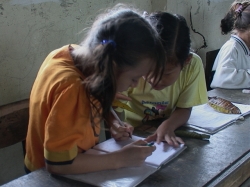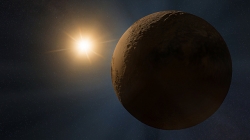The goal of science is to learn about the world. Even though you might have heard differently, things discovered in science are not just found by one person, but instead by a large group of people that work together and all follow the same set of rules. Science uses facts, careful studies, and lots of tests. On the other hand, it also uses imagination and creativity. From time to time, science is used to help figure out a problem, like cure a sickness, and other times, it is used just to answer a question someone is wondering about. No matter what its goal is, science is changing the world by having so many people
collaborate, or work together and share their ideas. Let's look at the big picture of science.

Collaboration is working together with other people. Two heads are better than one!
Quinn Dombrowski at Flickr.com
Reporting Scientific WorkNo matter what is being studied, scientists need to share what they find for others to grow and build upon their own studies. Talking and working with other scientists is very important to improving the field as a whole. For this reason, scientists will share what they have learned with their peers. A
peer is someone who has the same experience as you and works in the same field. Scientists could talk about what they learned at a small meeting, but then only the people who go to that meeting will learn about it. Instead, most share their work in peer-reviewed articles that are printed and can be read by many others doing the same kind of work. This way, many people can see the study and learn from it.
Peer-review is having people who do the same work as you look at what you discovered to make sure it is well done and correct. This helps to make sure that the study talked about in a paper is the work of that person, or in other words, to make sure that they did not copy it or take it from someone else. They also make sure that it is important and that it makes sense. Scientists print and give out their work so others can do the tests again in either the same or different setting. This will help make sure what they learn is right and allows others to build upon their work. What was found in a test the first time around must be the same as what others find if they do the same test again. This shows how important it is to repeat tests over and over again. In other words, if you only do it once, you may get just what you were seeking. If you do it fifteen more times and what you find is different each time, this may tell you that something is wrong with your test and it needs to be fixed. This is not only true for one person doing identical tests many times, but for many various people doing the same test. If they all uncover the same thing, in the end, that's a good sign.

The best way to verify your work is to have people who do similar work look it over.
modified from BrokenCities at Flickr.com
There are many journals and other forms of news that do not use a peer review system. There are now a lot of journals online that are free to read. Many of these use peer-review, but some do not. Anything that doesn't use peer review should not be trusted or even used when you are trying to learn more about something.
The Bad Part: Competition, Disagreement, and DebateStudying science, like everything else, takes money. Some of this money comes from a
grant, which is money from a group that has an interest in the study someone is doing. Not everyone who asks for money gets it. When people write grants to ask for money, they are also peer reviewed. We know that scientists work together and rely on each other's work. From time to time, though, some people do this not to help make science better, but just to help themselves in some way. In other words, they might just want praise for their work.

Grant proposals, which are written to ask for this money, are also subject to peer review.
401(K) 2012 at Flickr.com
Another important idea is that scientists do not always agree. Sometimes this has nothing to do with science, but with some other reason, like a person's politics or religion that may be different from the work of the person they are looking over. At times, this can stop scientists from sharing their work.
One of the most well known fights in science is over Pluto. While we know now that Pluto is not a planet because it is very different from other planets, this was not always the case. In the 1990's, astronomers began to discover different things in space that showed that Pluto shouldn't be called a planet, but instead a dwarf planet because it was so small. There was a lot of fighting about this until 2006, when the fighting ended. Pluto was no longer called a planet because enough important people in the field agreed on it. This reminds us that science is always changing as we learn and discover more.

In the 1990's, astronomers began to discover different things in space that showed that Pluto shouldn't be called a planet, but instead a dwarf planet because it was so small.
Kevin Gill at Flickr.com